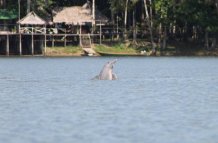Articles

River dolphins are an important part of the Amazon's aquatic ecosystems.
Exeter researchers help protect Peru’s river dolphins
River dolphins and Amazonian manatees in Peru will benefit from new protection thanks to a plan developed with help from the University of Exeter.
Researchers from the University’s Penryn Campus in Cornwall worked with Peruvian officials for more than two years to develop a new protection law.
The dolphins and manatees face threats from climate change, fishing and loss of habitat due to dams, pollution, noise and boat traffic. The new law establishes conservation and monitoring of habitats, and aims to bring about better management and more research.
“These species are only found in the Amazon,” said Dr Joanna Alfaro, who completed her PhD at Exeter and continues to work closely with the university.
“Neighbouring countries like Brazil, Colombia and Ecuador already had legislation to protect them, but Peru did not. To bring about this legislation, we worked in close collaboration with the Peruvian government, with support from WWF Peru, and held five workshops with local authorities.”
The new law – called the National Action Plan for the Conservation of River Dolphins and the Amazonian Manatee – has been approved by Peru’s Ministry of Production.
It will protect pink and grey river dolphins (Inia geoffrensis and Sotalia fluviatilis) and the Amazonian manatee (Trichechus inunguis) – all of which are of great importance to the aquatic ecosystems of the Amazon.
Dr Alfaro worked with fellow Exeter researchers Elizabeth Campbell and Jeff Mangel to help create the law.
Campbell said: “We are delighted to have been a part in the development of this law, and are excited to see the plan in full implementation. It was a long process but it showed how government agencies can work with non-governmental academics, private companies and others.”
Professor Brendan Godley, of the University of Exeter, who supervised the underpinning research, added: “We believe this action plan will aid conservation and reduce the threats that dolphins and manatees face in the Amazon today.
“It is a great example where research was used as a baseline for the legal framework to protect biodiversity.”
The project was funded by the Darwin Initiative, a UK government grants scheme that helps to protect biodiversity and the natural environment.
Date: 16 May 2017
